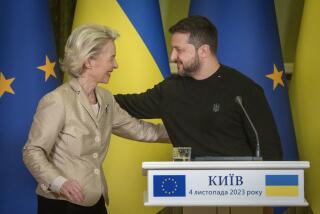Ready to Rejoin Europe, Albania Hints : Balkans: Foreign ministers of the region hear talk of reforms. Some are still skeptical.
- Share via
TIRANA, Albania — This Balkan nation peeked out from its self-imposed isolation Wednesday to hint at a willingness to reform and rejoin Europe, presenting a new face of conciliation to the outside world it has long denounced.
Although Albania’s pledge to pursue democracy was welcomed at a rare meeting of foreign ministers from the six fractious Balkan nations, Europe’s last hard-line Stalinist regime was told that it is still too repressive to be part of any community of nations.
The regional foreign ministers’ conference is only the second of the kind since World War II and the only postwar conference involving democratic states ever with Albania as host. Albania is the poorest and most backward country on the continent.
President Ramiz Alia, who has announced plans for some cautious reforms, called on Balkan neighbors to bury rivalries that date back centuries to concentrate on improving trade ties and making this historically troubled region more secure and compatible with the developed West.
Greek Foreign Minister Antonis Samaras reminded his colleagues of Albania’s record on humanitarian issues and upbraided the host nation for taking a bow after only a few short and fitful steps toward democratic ideals.
“Can we call a country free if any man or woman in this country is not allowed to fully exercise their religious rights?” Samaras asked the Albanian delegates, who had put forward their promises of reform as peacemaking gestures. “And does it not equally apply for political and economic rights as well?”
Despite Eastern Europe’s collective casting off of their Communist chains last year, Albanians are still the subjects of inflexible and dogmatic rule, cut off from the developed world by the leadership’s xenophobic fear of foreign contact.
Churches and mosques have been closed for 45 years, with those still standing used for storage or Communist Party-controlled activities.
Albanians are for the most part still forbidden to travel or assemble publicly, except for groups organized by the party. Anyone caught trying to flee the country is beaten severely and jailed, according to the few diplomats still working in Tirana.
More than 5,000 Albanians left the country last summer after hurling themselves over fences and gates around foreign embassy compounds, forcing the Tirana leadership to grant them permission to leave. Most of the embassies have been closed as a way of protesting Albania’s continued refusal to let would-be emigres apply for visas without such desperate and life-threatening acts.
Alia opened the conference with a plea for economic cooperation among the Balkan nations as a guarantee of peace and security. As most of the ministers did, he was alluding to the various conflicts that make the Balkan peninsula between the Adriatic and Black seas the most volatile and potentially destabilizing region in Europe.
“We could hardly be satisfied with our cooperation in the humanitarian field,” Bulgaria’s Lyuben Gotsev noted soberly amid lofty statements of good intentions and mutual interests.
Turkey’s new foreign minister, Ahmet Kurtcebe, also pointedly remarked in the direction of Albania that democracy cannot be achieved “without full respect for human rights and freedom for personal and collective initiative.”
In addition to drawing Albania out of its political shell, the two-day meeting was organized to give each of the participants a chance to work toward resolving the long-nurtured grudges that have survived imperial rule and rigid communism to haunt the nations now trying to build democracy and free-market economies.
More to Read
Sign up for Essential California
The most important California stories and recommendations in your inbox every morning.
You may occasionally receive promotional content from the Los Angeles Times.














